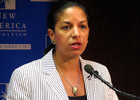
Update: News reports today indicate that the Sri Lankan government is ignoring calls by the Tamil Tigers to establish a ceasefire. According to the New York Times, the Tigers said they are responding to calls from the United Nations and a number of foreign governments for both sides to recognize a humanitarian ceasefire so that the tens of thousands of civilians trapped in the war zone can move to safety. The government rejected both the ceasefire and the Tigers’ claim: "They were not fighting with us; they were running from us,” said Sri Lanka’s defense secretary, Gotabaya Rajapaksa, according to Reuters. “There is no need of a cease-fire. They must surrender. That is it."
The U.N. dispatched its top humanitarian official, John Holmes, to Sri Lanka to negotiate with the government to allow a humanitarian mission into the war zone, where food and medical supplies for civilians are dwindling. Foreign ministers from Britian, France, and Sweden will arrive in Colombo early next week to address the grave humanitarian crisis.
Speaking to reporters this week after a Security Council meeting on Sri Lanka, U.N. Ambassador Susan Rice offered America’s view of the crisis and had harsh words for both the Sri Lankan government and the Tamil Tigers (LTTE):
We condemn the action by the LTTE to hold thousands of innocent civilians hostage in this so-called safe zone… (W)e call on the government not only to cease the shelling and the offensive military action, just as we call on the LTTE to do the same, but we call on the government to uphold its responsibility to provide support and assistance and access to the IDPs who are streaming into hospitals and camps… We think that it is absolutely imperative that both sides cease the fighting and the heavy shelling that is putting many thousands of civilians in immediate danger…the fact that both sides have been shooting at civilians as they these-leave the safe zone is one gross manifestation of the apparent violation of international humanitarian law.
Like Rice, Claude Heller, Mexico’s U.N. Ambassador and the current Security Council President, demanded an end to the violence:
We demand that the LTTE immediately lay down arms, renounce terrorism, allow a UN assisted evacuation of the remaining civilians in the conflict area, and join the political process through dialogue in order to put an end to the conflict…We urge all parties, including the Government of Sri Lanka, to abide by their obligations under international humanitarian law and to allow international and humanitarian agencies access to those affected by the fighting.
The Security Council attention to the issue as well as the arrival of U.N. Undersecretary General for Humanitarian Affairs John Holmes in the region underscores the gravity of the conflict and may help compel other international actors to action. However, as BBC notes, it seems unlikely that the United Nations will be able to robustly engage in Sri Lanka, given that both Russia and China have voiced opposition to U.N. engagement, deeming it an internal matter without international dynamics and making it difficult for the Council to officially take up the issue. The Security Council’s meeting this week, for example, took place in the basement of the U.N. headquarters and ended without an official statement.

